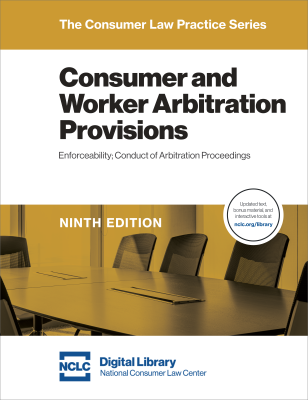Two very recent developments highlight the difficulties that debt buyers and collectors have in forcing FDCPA and other claims into arbitration. This article examines the implications of these two developments and also considers other issues in challenging an arbitration requirement where the consumer brings an action against a debt buyer or debt collector.
AAA Letter Refusing to Administer Arbitrations Involving Midland Funding
In an August 1, 2016 letter, the American Arbitration Association (AAA) stated that it would not arbitrate claims involving Midland Funding, one of the nation’s largest debt buyers. Midland Funding, as a debt buyer, relies on arbitration clauses found in the credit agreements that it purchases. If those arbitration agreements list the AAA as the sole arbitration forum, and that forum is integral to the agreement, then the arbitration agreement cannot be met as written. A large number of cases--collected at NCLC’s Consumer Arbitration Agreements § 5.8 (7th ed. 2015), updated online--hold that, if the designated forum is unavailable and that designation is integral to the agreement, then the arbitration requirement is unenforceable.
The letter, in stating that the AAA will not administer arbitrations involving Midland, lists several grounds for this determination: Midland’s failure in the past to promptly pay for arbitration services, Midland’s failure to waive provisions in arbitration agreements that violate the AAA’s consumer rules and due process protocol, and Midland’s failure upon request to submit an arbitration clause to the AAA’s consumer clause registry. See www.adr.org.
Letter’s Implications for Actions Against Other Debt Buyers and Collectors
This AAA letter concerning Midland Funding has a number of implications for litigation against other debt buyers and collectors. If a debt buyer or collector seeks to enforce an arbitration agreement, obtain a copy of the applicable arbitration agreement upon which the collector is relying. If the collector cannot produce this agreement then that should be grounds to defeat the arbitration requirement—see the discussion in the next section infra.
Many agreements upon which the collector will rely will designate the AAA as the exclusive arbitration forum. If the defendant is Midland, and the AAA’s designation is integral to the arbitration agreement, argue then the arbitration requirement should be unenforceable. If the defendant is not Midland, a good preliminary step—although a long shot—is to inquire of the AAA whether AAA refuses to administer arbitrations involving that defendant. Even if the AAA has not taken that action as to the defendant’s past actions, the defendant may not comply with AAA rules in a new dispute.
The AAA, for example, requires that the business in a consumer arbitration pay the lion’s share of arbitration fees, which can be quite hefty. There is a growing trend for companies to force consumers into arbitration but then refuse to pay their share of arbitration fees. Similarly, the defendant may fail to submit the arbitration clause upon which it relies to the AAA or otherwise fail to comply with the AAA’s consumer rules and due process protocol.
This not only should set that company up for future blanket denial of AAA arbitration, but will also mean that in that case where the company does not pay its cost assessment or otherwise fails to abide by AAA rules, , that the AAA should refuse to arbitrate the case. In that case, whether or not the AAA is the sole designated forum and whether or not designation of the AAA as the forum is integral to the agreement, the company, by refusing to participate in the arbitration, has waived its right to require arbitration. Instead, the consumer should be able to return to court and litigate the matter there. See NCLC’s Consumer Arbitration Agreements § 8.4.4 (7th ed. 2015), updated online.
Some older contracts will either list the National Arbitration Forum (NAF) as the sole arbitration forum or designate NAF or AAA in the alternative. Because of a law enforcement action, the NAF has agreed not to administer any consumer arbitrations. Thus designation of the NAF as the sole forum may make the agreement unenforceable, and designation of both NAF and AAA should be treated as the AAA being the sole designated forum.
Eleventh Circuit Requires Collector to Prove and Produce the Actual Arbitration Agreement
On July 5, the Eleventh Circuit, in Bazemore v. Jefferson Capital Sys., L.L.C., 2016 WL 3608961 (11th Cir. July 5, 2016), issued an important ruling concerning the evidence that must be produced to prove that an arbitration agreement exists. This same issue has been litigated in a number of courts, which hold that if there is insufficient evidence that an arbitration agreement exists, then the debt buyer or collector (or anyone else) cannot rely on that agreement to force arbitration. See the online version of NCLC’s Consumer Arbitration Agreements § 5.1.1a.
In many other cases, debt buyers have tried to rely on “sample” arbitration agreements that would have been in place around the time the consumer entered into a relationship with the creditor. The debt buyer in Bazemore went one step further by introducing an affidavit from the originating creditor, but without evidence of the consumer’s actual arbitration agreement with the creditor, the court deemed the evidence insufficient to establish an agreement to arbitrate.
The Eleventh Circuit in Bazemore first stated the existing law that ordinary state law contract law applies to such proof and that there is no presumption as to the existence of an arbitration agreement or any burden on the consumer to prove that the arbitration agreement does not exist. Instead, the party wishing to invoke the arbitration requirement has the burden of proving the arbitration agreement. See Id. § 5.1.1a.
The debt buyer in Bazemore took the unusual step of obtaining an affidavit from the originating creditor’s employee, and that employee alleged in the affidavit that the consumer had entered into a binding arbitration agreement and attached an arbitration agreement that the creditor used in many of its standard form agreements. The Eleventh Circuit found this affidavit offered inadequate proof that the particular consumer had in fact entered into a specific credit agreement that contained a specific arbitration agreement.
No evidence was produced that the consumer had in fact been sent that particular credit agreement or that the credit agreement the consumer had entered into included the particular arbitration clause mentioned in the affidavit. The debt buyer failed to produce the specific arbitration agreement that had been sent to the consumer or otherwise prove that the consumer had assented to an agreement containing specific language.
In an individual court action, it is likely that a debt buyer or even a collector will not go to the bother of trying to meet the Bazemore standard by producing the applicable arbitration agreement and prove that the consumer had assented to that exact arbitration language. Debt buyers do not initially possess evidence of a binding agreement and certainly do not have a copy of the credit agreement with its arbitration clause. The debt buyer will have to seek that evidence from the originating creditor, and there may be costs or even contractual restrictions on the debt buyer’s ability to obtain that information.
In addition, the debt buyer will be relying on the arbitration agreement as an assignee of the original creditor. To enforce the arbitration agreement, it must prove not only the arbitration agreement but that it is in fact an assignee of the original creditor that entered into the arbitration agreement.
Moreover, a debt buyer may be several debt purchases removed from the original creditor—the creditor sells the debt to debt buyer A who sells it to debt buyer B who sells it to the debt buyer defendant in the consumer’s action. This not only makes proof of ownership of the debt more difficult (the debt buyer needing to prove transfers from the creditor to debt buyer A and from A to B and from B to the defendant), but also makes seeking information from the original creditor problematical. The debt buyer defendant may have to seek the information from debt buyer B who seeks it from debt buyer A, who seeks it from the originating creditor. See also NCLC’s Fair Debt Collection § 2.4.8.3 (8th ed. 2014), updated online.
Other Grounds to Resist Debt Buyer and Collectors’ Reliance on Arbitration Clauses
While debt buyers as assignees should have the right to enforce an agreement (if they can prove the assignment and the arbitration agreement), debt collectors collecting on debts owned by another are not assignees but agents or independent contractors. When the collector is collecting on behalf of the original creditor, issues arise not only whether the collector can prove the arbitration agreement, but whether the collector has rights to enforce another party’s arbitration agreement. This issue is examined in some detail at NCLC’s Fair Debt Collection § 2.4.8.5 (8th ed. 2014), updated online.
When a collector is collecting for a debt buyer instead of the original creditor, then the collector must not only prove the arbitration agreement and that it has rights under that agreement, but also that the debt buyer has present ownership of the debt. For collectors and for debt buyers there also may be issues (depending on how the arbitration agreement is worded) as to whether the arbitration requirement applies to a tort claim or only to a claim under the contract. See Id. § 2.4.8.6.
Of course, any other ground to challenge an arbitration agreement that is applicable to other defendants should be available to challenge a debt buyer or collector’s reliance on the agreement. See generally NCLC’s Consumer Arbitration Agreements (7th ed. 2015), updated online.


